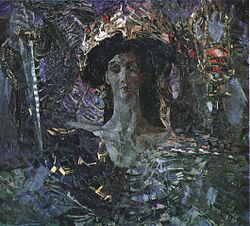Azrael

Azrael is the Islamic Archangel of Death. He is also the Angel of Death in Judeo-Christian extrabiblical tradition and folklore. It is an English form of the Arabic name Azra'il (عزرائيل) or Azra'eil (عزرایل), the name traditionally attributed to the angel of death in Islam and some Hebrew lore.[1] The Qur'an never uses this name, referring instead to Malak al-Maut (which translates directly as angel of death). It is also spelled Izrail, Izrael, Azrail, Ezraeil, Azraille, Azryel, or Ozryel. Chambers English dictionary uses the spelling Azrael. The name literally means Whom God Helps.[1]
Background
Although some sources have speculated about a connection between Azrael and the human priest Ezra,[2] he is generally depicted as an archangel whose history long predates this figure.[3] Rather than merely representing death personified, Azrael is usually described in Islamic sources as subordinate to the will of God "with the most profound reverence."[4] In Jewish mysticism he is identified as the embodiment of evil, not necessarily or specifically death itself.[1] Depending on the outlook and precepts of various religions in which he is a figure, Azrael may be portrayed as residing in the Third Heaven.[5] In one of his forms, he has four faces and four thousand wings, and his whole body consists of eyes and tongues, the number of which corresponds to the number of people inhabiting the Earth. He will be the last to die, recording and erasing constantly in a large book the names of men at birth and death, respectively.[6]. The angel of death is seen as many different ways to different religions.
In art and literature
Azrael, as both a character or a more abstract concept has been adopted by many different artists, musicians, poets, and authors over the centuries to express or evoke a variety of different meanings or emotions in the reader – often drawing on the cultural resonance of the name for effect.

In literature, Azrael has been featured by a variety of authors, across a broad range of styles and countries. Recently in the West, he has been written about by Terry Pratchett in both Reaper Man and Good Omens, the latter coauthored by Neil Gaiman and as the main character in Anne Rice's "Servant of the Bones." He also forms part of the underworld pantheon in the Dragon King series by Stephen Lawhead. Philip Pullman's Lord Asriel from His Dark Materials might also be an allegory for Azrael. The playwright Arthur Miller wrote in Azrael as a character in "The Creation of Life and Other Business", while the Mexican poet Amado Nervo wrote a poem entitled Azrael. The character has even found a place in popular culture – emerging as a costumed superhero named Azrael in the fictional Batman universe, and in the French graphic novel "Poulet aux prunes". Mimi Force, one of the teen vampires in the Blue Bloods series by Melissa de la Cruz, is supposed to be the reincarnated version of Azrael. He even formed the title of the CSI: NY episode "Here's To You, Mrs. Azrael", featuring a homicidal mother. Also, he appeared as a character played by Jason Lee in the Kevin Smith movie Dogma though in a vastly different interpretation, as a fallen muse and demon, rather an angelic assassin. In music, Azrael has been written about in both songs and albums by such varied acts as Demons & Wizards, Coil, The Nice, Crimson Glory and VNV Nation – classically, Asrael is a symphony by Czech composer Josef Suk, dating from 1906. In the comic book genre, writer Marc Guggenheim wrote Azrael as the warrior/angel of death whom Wolverine has to fight every time he suffers a lethal wound in order to save his soul, which is returned to his physical body if he is victorious.[7]. It is also the name of the Wizard Gargamel's cat in the cartoon The Smurfs and the name of the leader of the fictional chapter of Space Marines from Games Workshop known as the Dark Angels. The Swedish black metal band Marduk named one of their songs Azrael, on their album La Grande Danse Macabre. The name also features in the 1996 PC game Azrael's Tear; the game also featured a specific Biblical quote relating to Azrael's function as Angel of Death. The song Cyanide by heavy metal band Metallica is said to be conceptually inspired by Azrael. Also, in the Playstation 2 game 'Chaos Legion', Azrael is the second last boss fought after Victor and before a possesed version of Selia, being the final boss. Furthermore, Azrael has also been used in the Blue Bloods Series by Melissa De La Cruz. The character, Mimi Force is known to actually be Azrael, angel of Death.
See also
- Death (personification)
- Angels in Islam
- Thanatos - The personification of Death in Greek Mythology
References
- ^ a b c Davidson, Gustav (1967), A Dictionary of Angels, Including The Fallen Angels, Entry: Azrael, pp. 64, 65, Library of Congress Catalog Card Number: 66-19757
- ^ Who is Azrael? The Man to the Myth, The Azrael Chronicles: A Compendium of the Books of Azrael ha'Malak, wgOfAzrael.org
- ^ Lindemans, Mica F., Azrael at the Encyclopedia Mythica
- ^ Hanauer, J.E. (1907), Folk-lore of the Holy Land: Moslem, Christian and Jewish, Chapter V: The Angel of Death, at sacred-texts.com
- ^ Davidson, Gustav (1967), A Dictionary of Angels, Including The Fallen Angels, Entry: Third Heaven, p. 288, Library of Congress Catalog Card Number: 66-19757
- ^ Hastings, James, Selbie, John A. (Editors) (2003), Encyclopedia of Religion and Ethics Part 3, Kessinger Publishing, 2003, ISBN 076613671X
- ^ Wolverine, vol.3, #58, writer Marc Guggenheim, artist Howard Chaykin, color artist, Edgar Delgado (Oct. 2007)
